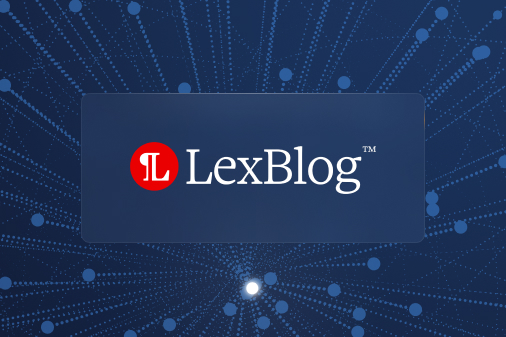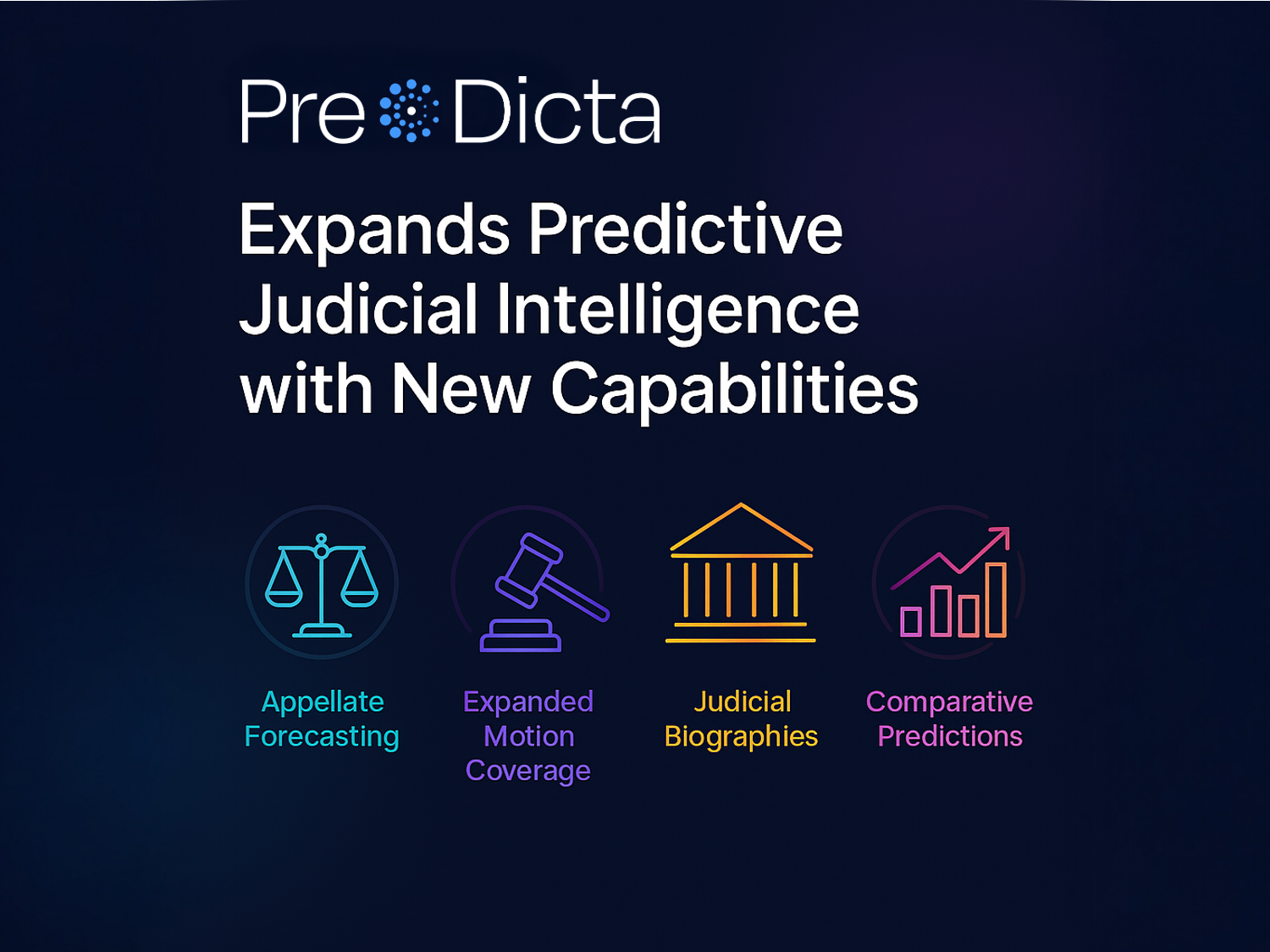Predictive judicial intelligence is changing how lawyers handle cases and help clients. Unlike traditional legal tools that examine past data, predictive intelligence reveals what might happen next in a case. This allows lawyers make better decisions throughout the entire case. With this technology, lawyers can anticipate what judges might do, plan more effective strategies, utilize their time and resources wisely, and achieve better results for their clients. This gives them an edge in a field that’s increasingly relying on technology. By understanding what might happen in their cases, lawyers can work more effectively and help clients more efficiently.
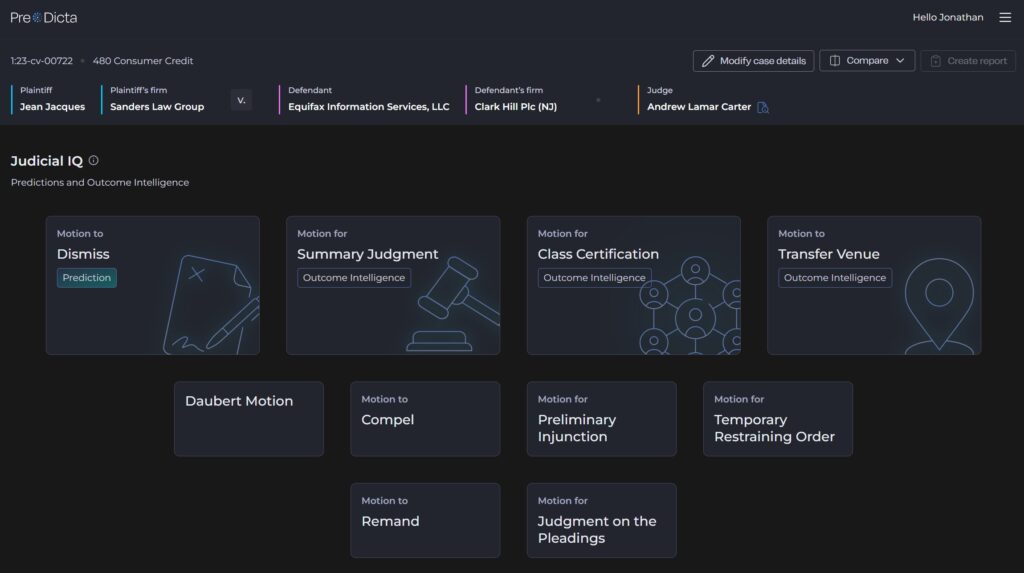
Key Takeaways: Predictive Judicial Intelligence
| Category | Impact |
|---|---|
| Prediction Accuracy | 85% accuracy in forecasting judicial rulings without reviewing case briefs |
| Strategic Planning | Quantifiable risk profiles replace attorney intuition with data-driven decision making |
| Resource Optimization | Precise allocation of legal resources based on predictive case timelines |
| Motion Strategy | Judge-specific insights for tailoring arguments and predicting procedural outcomes |
| Settlement Timing | Identification of strategic inflection points for maximum negotiation leverage |
| Business Integration | Translation of legal risks into actionable business intelligence for executives |
The Pre/Dicta Advantage: Predictive vs. Reactive Legal Analytics
- Unique Focus: Unlike conventional legal analytics tools, Pre/Dicta specializes in predictive judicial intelligence
- Forward-Looking Analysis: 85% accuracy in predicting judicial rulings on motions to dismiss
- Comprehensive Impact: Transforms 15+ critical areas of litigation strategy and business planning
- Data-Driven Decisions: Replaces intuition with objective, quantifiable risk profiles
- Strategic Advantage: Provides attorneys with structural advantages in case preparation and negotiation
Understanding the Distinction: Pre/Dicta’s Unique Position in Legal Technology
While many legal technology tools aid in document drafting, review, evidence management, and historical research, these solutions primarily assist attorneys in responding to what has already occurred. Pre/Dicta takes a fundamentally different approach by specializing in predictive judicial intelligence. This isn’t just another legal analytics platform, it’s a data-science backed method that enables attorneys to understand what’s going to happen next in their cases with unprecedented accuracy. The platform employs sophisticated algorithms that analyze thousands of variables across judicial decision patterns, providing insights that were previously inaccessible through conventional legal research.
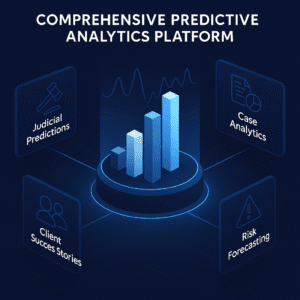 Think about the difference this way: traditional legal tech helps you organize what you know, while predictive judicial intelligence tells you what you need to know about future outcomes. It’s like the difference between having a detailed map of where you’ve been versus having a GPS that shows you the best route forward, complete with traffic predictions and alternative paths. This shift from retrospective analysis to forward-looking prediction represents a complete paradigm shift in how legal strategy is developed, moving from intuition-based practice to evidence-based methodology that can be measured, refined, and optimized over time.
Think about the difference this way: traditional legal tech helps you organize what you know, while predictive judicial intelligence tells you what you need to know about future outcomes. It’s like the difference between having a detailed map of where you’ve been versus having a GPS that shows you the best route forward, complete with traffic predictions and alternative paths. This shift from retrospective analysis to forward-looking prediction represents a complete paradigm shift in how legal strategy is developed, moving from intuition-based practice to evidence-based methodology that can be measured, refined, and optimized over time.
The implications of this predictive capability extend far beyond simple convenience. By providing attorneys with data-driven insights about future judicial behavior, Pre/Dicta transforms litigation from a reactive process into a proactively managed system. This affects virtually every aspect of civil litigation, from initial case assessment through final resolution, giving attorneys who adopt this technology a structural advantage over those who don’t. For example, knowing a judge’s typical timeline for ruling on summary judgment motions enables attorneys to better prepare clients for potential outcomes and develop contingency plans that address multiple scenarios, rather than being caught unprepared when decisions are made.
Strategic Planning & Enhanced Risk Assessment: Quantifying Litigation Outcomes
One of the most prominent challenges attorneys face is answering a fundamental question: “What are the actual chances of different outcomes in our case, and what does this mean for our business risk?” Old methods rely heavily on lawyers’ hunches and experience, which can vary significantly and lead to inconsistent assessments. This subjective approach often yields fuzzy risk calculations that can mislead clients and lead to sub-optimal strategic decisions throughout the case.
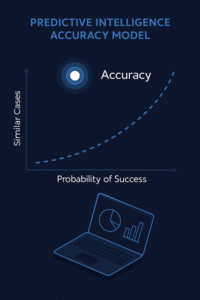 Pre/Dicta addresses this challenge by providing quantifiable risk profiles for each litigation stage. Instead of vague statements like “we have a good chance of winning,” attorneys can tell clients there’s a specific probability (like 72%) of success on a motion to compel or a 40% chance of prevailing at summary judgment. This precision enables proactive risk mitigation and a more strategic focus based on data rather than gut feeling. The platform’s algorithms analyze thousands of similar cases, judicial decision patterns, and case-specific variables to generate these probability assessments, creating a level of predictive insight previously impossible in legal practice.
Pre/Dicta addresses this challenge by providing quantifiable risk profiles for each litigation stage. Instead of vague statements like “we have a good chance of winning,” attorneys can tell clients there’s a specific probability (like 72%) of success on a motion to compel or a 40% chance of prevailing at summary judgment. This precision enables proactive risk mitigation and a more strategic focus based on data rather than gut feeling. The platform’s algorithms analyze thousands of similar cases, judicial decision patterns, and case-specific variables to generate these probability assessments, creating a level of predictive insight previously impossible in legal practice.
For example, a company facing potential class action litigation could use Pre/Dicta to assess the specific impact of class certification on its reputation, operations, and regulatory compliance. With this information, the legal team can develop targeted strategies to address the most significant risks rather than taking a scattershot approach. Similarly, a company could run simulations for various scenarios to guide aggressive fact discovery and amplify settlement leverage at precisely the right moment. These data-driven insights enable legal teams to allocate resources more effectively, focusing on aspects of the case most likely to influence the outcome while reducing effort on strategies with a lower probability of success.
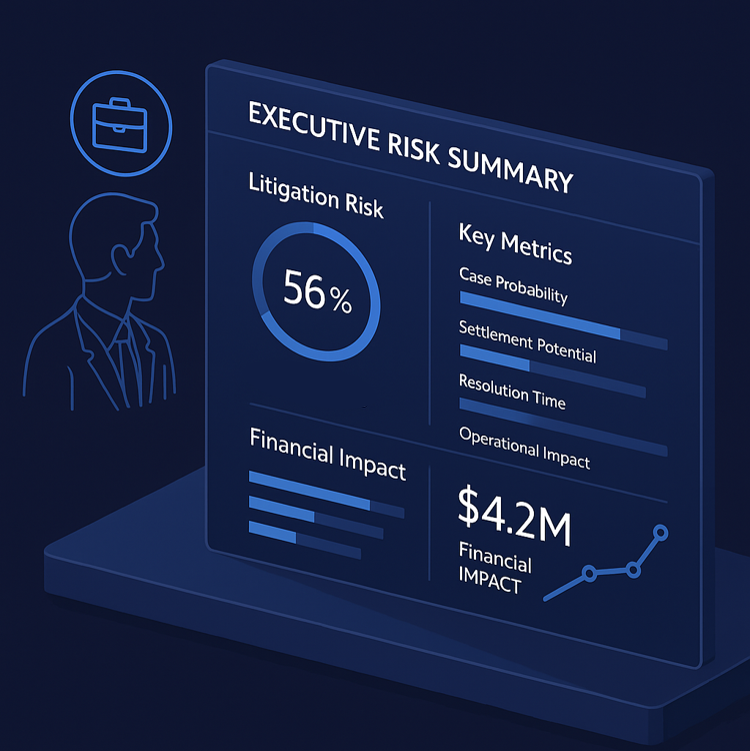
Law Firm and Counsel Evaluation: Data-Driven Selection Process
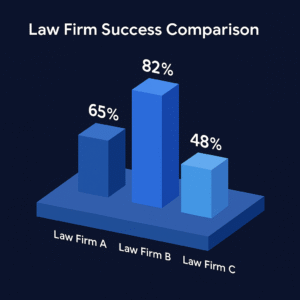 When picking legal representation, clients often wonder: “Which law firm or lawyer is most likely to win our case, considering the judge and other unique factors?” Typically, this decision is based on reputation, past relationships, and gut feelings, which may not accurately predict how well a lawyer will perform in specific cases. This can lead to poor matches between legal matters and lawyer skills, potentially resulting in higher costs and less favorable outcomes.
When picking legal representation, clients often wonder: “Which law firm or lawyer is most likely to win our case, considering the judge and other unique factors?” Typically, this decision is based on reputation, past relationships, and gut feelings, which may not accurately predict how well a lawyer will perform in specific cases. This can lead to poor matches between legal matters and lawyer skills, potentially resulting in higher costs and less favorable outcomes.
Pre/Dicta changes this process by showing how different law firms are likely to perform throughout a case. The system analyzes the efficiency of firms during discovery and motion practice, taking into account the specific judge and unique case details. This allows clients to select lawyers who are most likely to help them achieve their business goals, rather than just choosing the biggest name or the firm they’ve used before. The system’s intelligent algorithms can identify patterns in lawyer performance that may not be apparent from traditional credentials or reputation, revealing which lawyers excel in specific situations or before certain judges.
For companies handling multiple lawsuits, this gives unprecedented insight into which firms perform best in specific contexts. A company might discover that while Firm A has an excellent overall reputation, Firm B actually has a significantly higher success rate before the particular judge assigned to their case. This data-driven approach to counsel selection ensures that clients make informed decisions about representation that align with their specific case needs and risk tolerance. Additionally, the platform can help identify specialized dynamics that may be particularly valuable for particular types of motions or procedural phases, allowing clients to assemble legal teams with complementary strengths tailored to their unique litigation challenges.
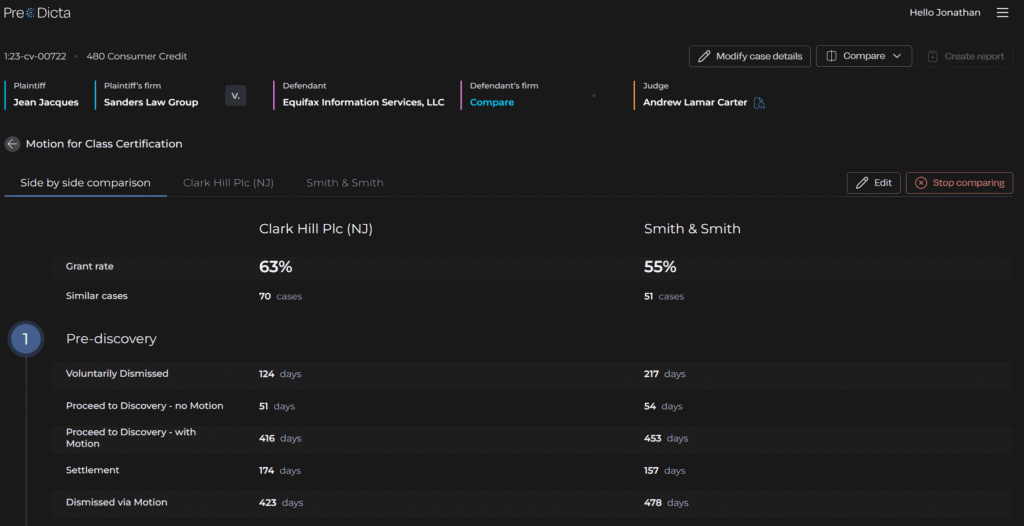
Budgeting and Resource Allocation: Precision in Financial Planning
One of the most complex aspects of managing lawsuits is determining: “What resources do we need and how long will each phase of the lawsuit take so that we can plan our budget and staff correctly?” Traditional methods often use rough estimates based on similar past cases, which frequently leads to going over budget and having resource problems. These mistakes can strain relationships with clients, create money problems for law firms, and waste legal talent throughout the case.
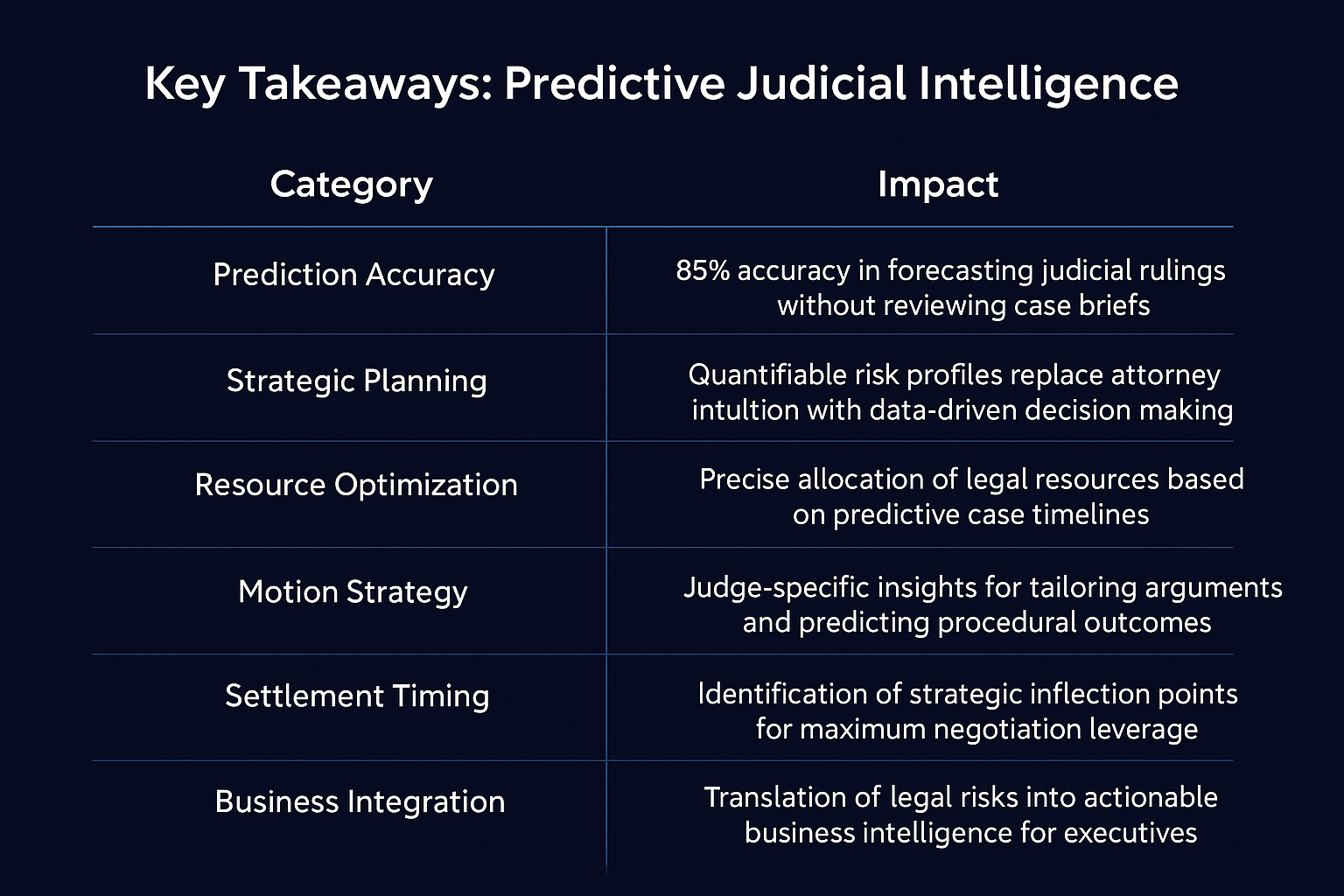 Pre/Dicta addresses this issue by offering detailed lawsuit timelines and cost forecasts derived from predictive analytics. This helps law firms assign their people precisely, minimizing budget overruns and aligning financial planning with specific litigation stages. For clients, this means more predictable legal expenses and fewer surprises as the case progresses. The platform analyzes thousands of similar cases to identify patterns in how long each litigation phase typically takes before specific judges, allowing for much more accurate timeline predictions than traditional estimation methods.
Pre/Dicta addresses this issue by offering detailed lawsuit timelines and cost forecasts derived from predictive analytics. This helps law firms assign their people precisely, minimizing budget overruns and aligning financial planning with specific litigation stages. For clients, this means more predictable legal expenses and fewer surprises as the case progresses. The platform analyzes thousands of similar cases to identify patterns in how long each litigation phase typically takes before specific judges, allowing for much more accurate timeline predictions than traditional estimation methods.
The impact goes beyond just controlling costs. By accurately predicting resource needs and timelines, firms can free up time for new cases and optimize staffing across all their cases. For example, a firm might learn that, based on the judge’s typical timeline for similar cases, they should expect a summary judgment decision within four months, rather than the six months they initially estimated. This allows them to plan staffing more efficiently and potentially take on additional matters that they might otherwise have declined due to capacity concerns. Additionally, the platform can help identify which phases of litigation are likely to require the most intensive resources, allowing firms to schedule attorney workloads to avoid bottlenecks and ensure appropriate expertise is available when needed most.
Forum and Jurisdiction Strategy: Optimizing Venue Selection
The question of “Which court gives us the best chance to win our case?” has big strategic importance. Traditional approaches rely on general impressions about courts or personal experiences rather than specific data analysis of how judges in those courts tend to rule. This can lead to poor venue choices that fundamentally impact how a case unfolds and its outcome from the very beginning.
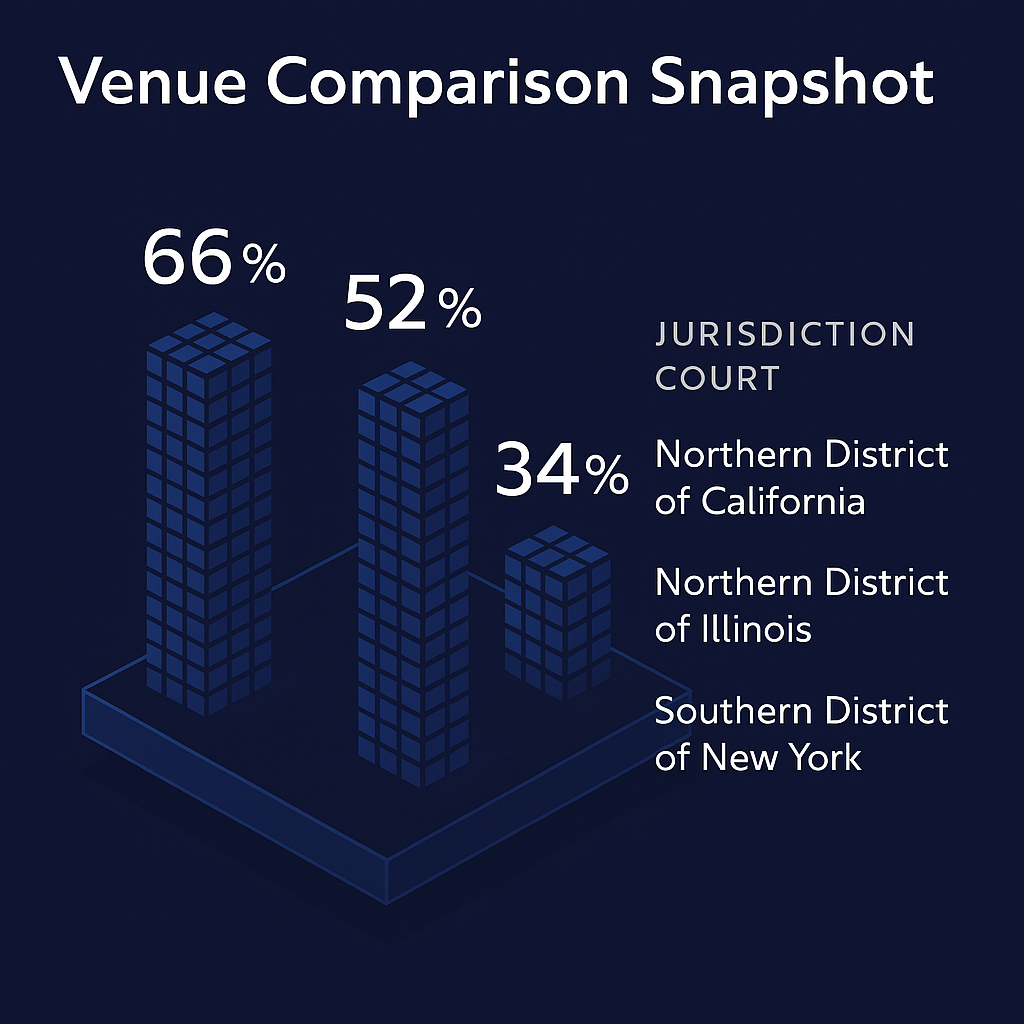
Pre/Dicta transforms this decision-making by enabling comparisons across venues to identify the most effective filing or transfer strategies. For example, a company could use an analysis showing a 65% chance of surviving a motion to dismiss in the Northern District of California compared to only 35% in the Western District of Texas. This data-driven insight might lead them to file in the NDCA for a better outcome or stronger settlement position. The platform’s algorithms analyze judicial decision patterns across jurisdictions, taking into account case type, subject matter, and specific legal issues to provide nuanced venue recommendations tailored to each unique case.
This capability extends to decisions about challenging judicial assignments or seeking transfers based on specific judicial tendencies. By understanding how different judges within and across jurisdictions approach similar cases, attorneys can make strategic decisions about where to file and whether to pursue reassignment or transfer motions. This level of venue-specific intelligence provides attorneys with a significant advantage in positioning their cases for success from the outset. Additionally, the platform can identify which specific legal arguments tend to be more successful in different venues, allowing attorneys to tailor their approach to the preferences and tendencies of the judges in each jurisdiction, further increasing their chances of favorable outcomes.
Motion Strategy: Precision in Procedural Decisions
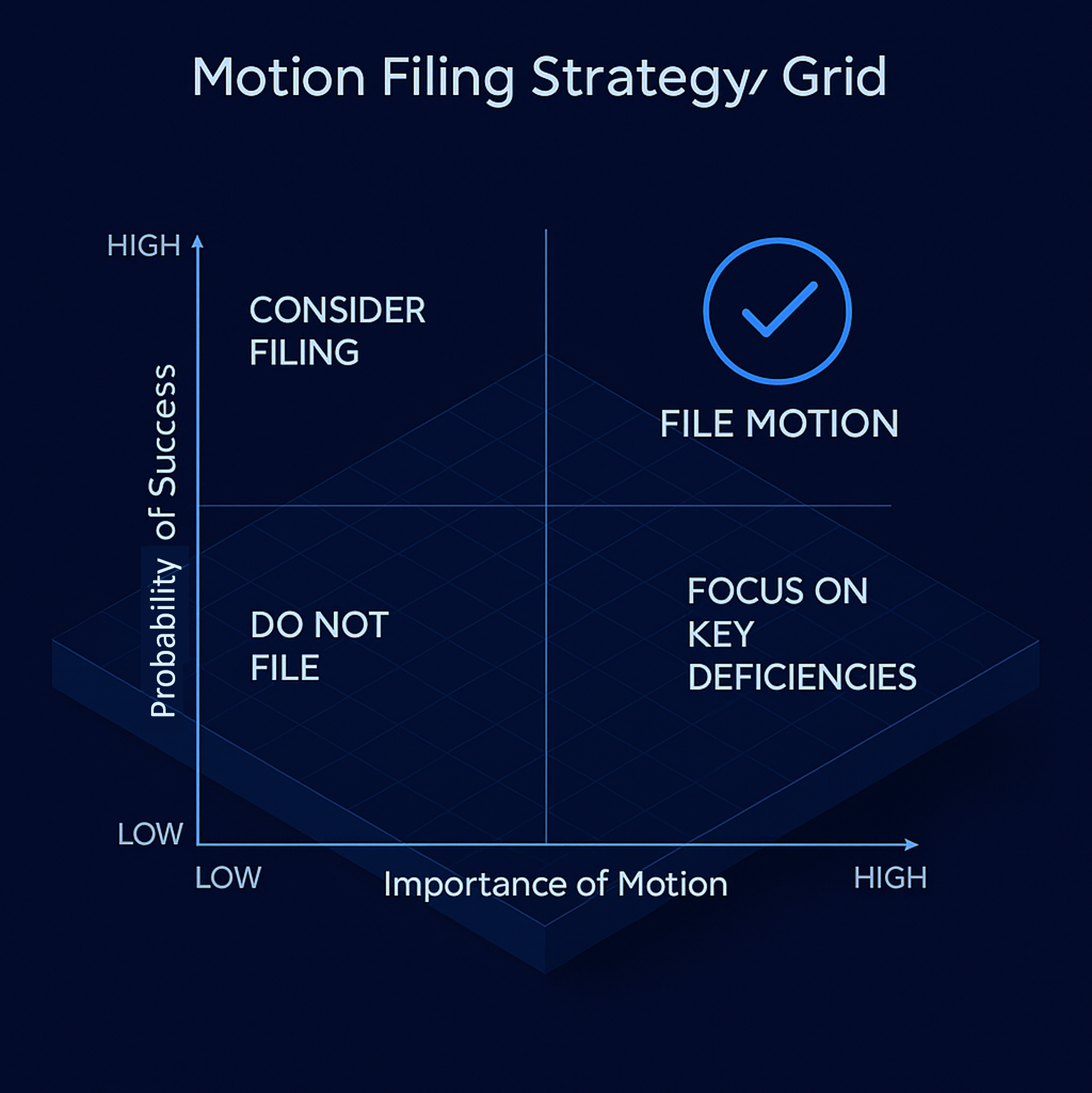 Motion practice is a key area where predictive judicial intelligence is particularly helpful. Lawyers often wonder: “Given our judge and case details, what are our chances of winning a specific motion, and how should we tailor our arguments or even decide whether to file it?” Without data-driven insights, lawyers must rely on general legal principles and limited personal experience with particular judges, potentially missing crucial opportunities to optimize their approach.
Motion practice is a key area where predictive judicial intelligence is particularly helpful. Lawyers often wonder: “Given our judge and case details, what are our chances of winning a specific motion, and how should we tailor our arguments or even decide whether to file it?” Without data-driven insights, lawyers must rely on general legal principles and limited personal experience with particular judges, potentially missing crucial opportunities to optimize their approach.
Pre/Dicta solves this by forecasting the likelihood of success for various motion types with remarkable accuracy. The platform achieves 85% accuracy in predicting judicial rulings on motions to dismiss without even reviewing the briefs or facts of the case, instead focusing on the behavioral analytics of judges and other actors. This level of predictive insight allows attorneys to make strategic decisions about which motions to file, when to file them, and how to structure their arguments for maximum effectiveness with the specific judge assigned to their case.
This predictive capability transforms motion practice. When a motion to dismiss has a low likelihood of success, attorneys can adopt a more targeted approach, narrowly focusing on key deficiencies to preserve stronger arguments for later stages. Similarly, the platform helps anticipate outcomes for potentially case-changing motions, such as class certification, which can dramatically alter a case’s trajectory and settlement potential. This allows attorneys to focus their efforts on the motions most likely to succeed and craft arguments tailored to the specific tendencies of the assigned judge. Additionally, the platform can identify which legal authorities and argument structures have historically been most persuasive to particular judges, enabling attorneys to frame their arguments in ways that align with the judge’s demonstrated preferences and decision-making patterns.
Negotiation Leverage & Settlement Strategy: Timing for Optimal Outcomes
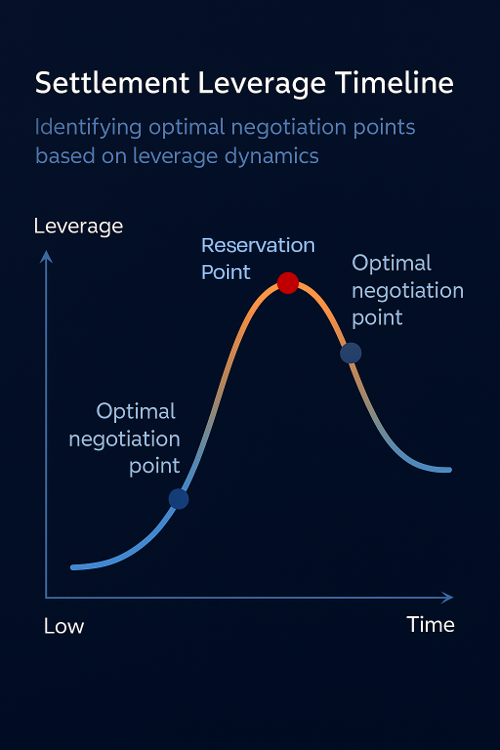 Determining the optimal time to settle a case to maximize your advantage and minimize costs is a crucial strategic decision in lawsuits. Traditional approaches rely heavily on intuition and experience rather than data-driven analysis to determine when a case is best positioned for resolution. This intuition-based approach often leads to missed opportunities for favorable settlements or premature negotiations from positions of weakness, ultimately affecting client outcomes and satisfaction.
Determining the optimal time to settle a case to maximize your advantage and minimize costs is a crucial strategic decision in lawsuits. Traditional approaches rely heavily on intuition and experience rather than data-driven analysis to determine when a case is best positioned for resolution. This intuition-based approach often leads to missed opportunities for favorable settlements or premature negotiations from positions of weakness, ultimately affecting client outcomes and satisfaction.
Pre/Dicta transforms this process by identifying strategic points where leverage peaks or dips based on likely judicial behavior. AI-driven predictions help time settlement offers strategically, capitalizing on moments when the opponent’s leverage is likely to be at its lowest. This precision in timing can make the difference between a favorable settlement and a lengthy, expensive lawsuit. The platform analyzes patterns in case progression, judicial decision-making timelines, and the impact of specific procedural events on settlement dynamics to identify these optimal negotiation windows with unprecedented accuracy.
For example, in antitrust litigation, Pre/Dicta might determine that the optimal time for settlement is just after class certification is forecast to be denied. This precise timing information allows attorneys to approach negotiations with confidence, backed by data rather than intuition. By identifying these strategic inflection points, Pre/Dicta helps attorneys maximize client outcomes while minimizing the costs and risks associated with continued litigation. Additionally, the platform can help attorneys to quantify the likely settlement value ranges at various stages of litigation, enabling clients to make informed decisions about when to resolve cases and what terms to accept. This data-driven approach to settlement strategy removes much of the guesswork from what has traditionally been one of the most subjective aspects of litigation management.
Business Continuity & Executive Positioning: Translating Legal Risk
Company executives and boards frequently struggle to comprehend the impact of lawsuits on operations, financial performance, and shareholder value. Traditional legal reports often fail to translate legal risk into business terms that executives can use for planning. This communication gap can lead to misalignment between legal strategy and business goals, potentially resulting in poor decision-making at the executive level and unexpected disruptions to business operations.
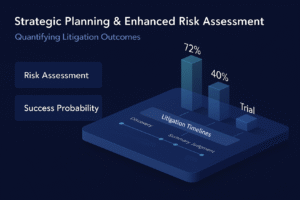 Pre/Dicta helps by providing predictive insights that help executives understand lawsuit risk in business terms. This allows companies to prepare financially and operationally for various lawsuit outcomes and inform investors about potential impacts on shareholder value. The platform translates complex legal probabilities into clear business metrics that executives can use in their planning, bridging the gap between legal departments and executive leadership.
Pre/Dicta helps by providing predictive insights that help executives understand lawsuit risk in business terms. This allows companies to prepare financially and operationally for various lawsuit outcomes and inform investors about potential impacts on shareholder value. The platform translates complex legal probabilities into clear business metrics that executives can use in their planning, bridging the gap between legal departments and executive leadership.
For example, a company might use Pre/Dicta to understand the likelihood of a case proceeding beyond summary judgment, enabling them to make appropriate financial provisions and operational contingency plans. This translation of legal risk into business terms facilitates better integration of litigation management into overall corporate strategy. Rather than treating litigation as an isolated legal issue, executives can understand its potential business impacts and plan accordingly. Additionally, the platform can help quantify the likely financial implications of different litigation outcomes, allowing for more accurate financial forecasting and risk management. This capability is particularly valuable for publicly traded companies that must provide accurate risk disclosures to investors and regulatory authorities.
The Future of Legal Strategy: Data-Driven Decision Making
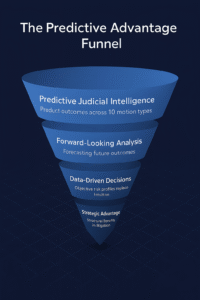 The legal profession is at a significant turning point. While lawyers have traditionally relied on intuition and experience, which can lead to inconsistencies and subjective judgments, AI-powered predictive intelligence provides objective, data-driven insights that refine judgment and enable faster, more accurate decision-making. This technology isn’t replacing lawyer expertise, but rather making it better, by giving lawyers tools that enhance their abilities and help them achieve better results for clients.
The legal profession is at a significant turning point. While lawyers have traditionally relied on intuition and experience, which can lead to inconsistencies and subjective judgments, AI-powered predictive intelligence provides objective, data-driven insights that refine judgment and enable faster, more accurate decision-making. This technology isn’t replacing lawyer expertise, but rather making it better, by giving lawyers tools that enhance their abilities and help them achieve better results for clients.
In 2004, a statistical model was able to predict 75% of U.S. Supreme Court decisions, outperforming legal experts. Pre/Dicta builds on this foundation, achieving 85% accuracy in predicting judicial rulings on motions to dismiss without even reviewing the briefs or facts of the case, instead focusing on the behavioral analytics of judges and other actors. These advances demonstrate that legal outcomes are more predictable than previously thought, challenging the traditional notion that litigation is inherently unpredictable and can’t be systematically analyzed.
The question isn’t whether predictions are possible, but whether attorneys are willing to walk into motion practice blind to their judge’s identifiable tendencies, especially when their opponents may not be. This shift means that attorneys who embrace these tools will have a structural advantage, transforming litigation from a reactive process into a proactively managed system. By combining human expertise with data-driven insights, attorneys can deliver more effective service to clients and achieve more favorable outcomes. As adoption of these technologies increases, we can expect to see a widening gap between firms that leverage predictive intelligence and those that continue to rely solely on traditional methods, with clients increasingly gravitating toward providers who can demonstrate superior results through data-driven approaches.
Conclusion: The Competitive Advantage of Predictive Judicial Intelligence
Pre/Dicta represents a big change in how lawyers approach litigation strategy. By providing predictive judicial intelligence across the entire litigation lifecycle, the platform enables attorneys to make data-driven decisions that improve outcomes, reduce costs, and enhance client service. This transformation affects every aspect of legal practice, from initial case evaluation to final resolution, creating unprecedented opportunities for attorneys to deliver superior results while managing resources more efficiently.
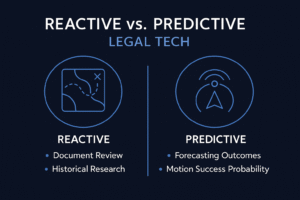 The competitive advantage for early adopters is clear. While traditional legal analytics tools help you understand what happened in the past, Pre/Dicta helps you anticipate what will happen next. This forward-looking approach transforms every aspect of litigation strategy, from case intake and forum selection to motion practice and settlement negotiations. Attorneys who leverage these predictive capabilities can provide more accurate risk assessments, develop more effective strategies, and achieve better outcomes for their clients than those relying solely on traditional methods.
The competitive advantage for early adopters is clear. While traditional legal analytics tools help you understand what happened in the past, Pre/Dicta helps you anticipate what will happen next. This forward-looking approach transforms every aspect of litigation strategy, from case intake and forum selection to motion practice and settlement negotiations. Attorneys who leverage these predictive capabilities can provide more accurate risk assessments, develop more effective strategies, and achieve better outcomes for their clients than those relying solely on traditional methods.
As the legal industry continues to evolve, those who adopt predictive judicial intelligence will gain a structural advantage in case preparation, negotiation, and client service. The question is no longer whether to incorporate predictive analytics into legal practice, but how quickly attorneys can integrate these powerful tools into their strategic workflows. By providing attorneys with unprecedented insight into judicial behavior and case outcomes, Pre/Dicta is not just improving legal practice, it’s fundamentally transforming how litigation strategy is developed and executed. Forward-thinking law firms and corporate legal departments that adopt these technologies now will position themselves at the forefront of legal innovation, creating sustainable competitive advantages that will become increasingly valuable as clients demand more predictable, efficient, and effective legal services.


